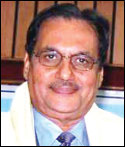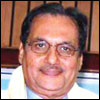 Vijay K. Saluja is a Senior Fellow (Urban Studies) at the Institute of Social Sciences, New Delhi, and is currently working in the critical areas of local good governance, training of elected representatives and municipal functionaries, community participation, urban local bodies, effective infrastructure project management, good city governance, and role of values and ethics.
Vijay K. Saluja is a Senior Fellow (Urban Studies) at the Institute of Social Sciences, New Delhi, and is currently working in the critical areas of local good governance, training of elected representatives and municipal functionaries, community participation, urban local bodies, effective infrastructure project management, good city governance, and role of values and ethics.
Urban infrastructure is one of Saluja’s key areas. About the current growth of urban infrastructure, he says, “Due to rapid urbanisation, it was/is all the more imperative that all possible innovative, imaginative measures could have been taken by all the concerned stakeholders in a properly, planned (on long-term basis), designed and executed in a time bound manner, ensuring quality control and thus aesthetics, durability and sustainable maintenance thereafter. But, most of the parameters to ensure the same are missing, in the overall scheme of things.”
Saluja appears to be unhappy over the state of infrastructure development in the country and the experts and professionals who are guiding the sector. He says, “Muteness of professionals, filling the innards (executive committees) of Institution of Engineers, Indian Roads Congress, Indian Buildings Congress and many other professional bodies, contractors, and consultants-associations have made the infrastructure world of India a happy merry-go-round for making money (both overhand and underhand)!”
A former Chief Engineer (Civil) in New Delhi Municipal Council, Vijay K. Saluja received his B. Tech (Civil) from IIT Delhi in 1968. He did a certificate course in Management of Urban Renewal from University of Birmingham, UK, where he was nominated in 1988, under Colombo Plan, by the Government of India.
Saluja started working with New Delhi Municipal Council in 1969 as an assistant engineer and retired as chief engineer, a 35-year service in various areas of municipal engineering and management—buildings, roads, basic services, infrastructure, property tax, human resource development and various local governance issues. He superannuated in 2004 as chief engineer (civil). He joined Institute of Social Sciences in 2008.
Some of the projects handled by Saluja during his tenure at New Delhi Municipal Council are the construction of 5-star hotel Taj Mansingh in Delhi, social infrastructure like staff colony, school and ESS buildings, underground market and parking, widening and resurfacing of roads in New Delhi by hot recycling technology, water supply, and drainage and sewerage works.
When his view was sought on how engineering colleges can help their students shape their future, Saluja advised that the faculty in IITs and engineering colleges should come out of their cocoons and ignite the minds of their students on the need for integrity and professional competency. “But all this can be possible if the top political leadership becomes the beacon light of integrity, commitment and meritocracy,” he says.
A tall order, no doubt, but then, having a balanced and proper growth of India’s urban infrastructure is not a dwarfish tale either.
Vijay K. Saluja is a recipient of the Commendation award by the IIT Delhi Alumni Association (1995), the Red & White Bravery award (2002), and the Giraffe Heroes award (2004). He was also conferred the Satyendra K. Dubey Memorial Award of IIT Kanpur in 2009. Besides, he has presented more than 50 technical papers in areas of contract, maintenance and project management, infrastructure, basic services, local governance, and other areas of city management, at both national and international conferences. He regularly writes on various urban issues for newspapers, journals and magazines.
In June 2012, he was appointed Director of Giraffe Heroes India Programme by Giraffe Heroes Project, USA.











